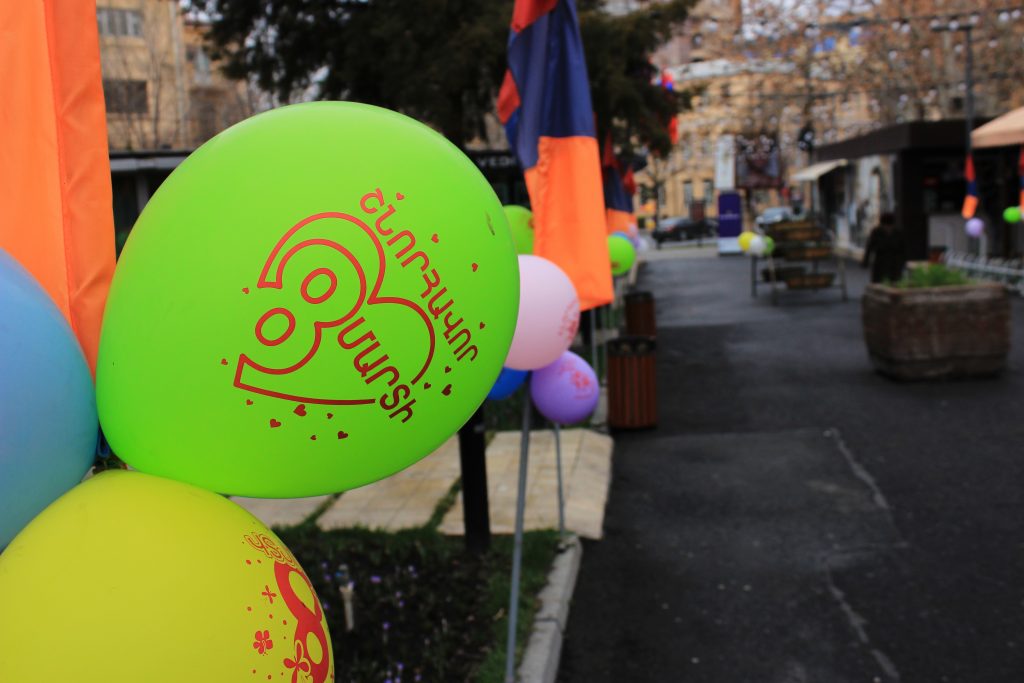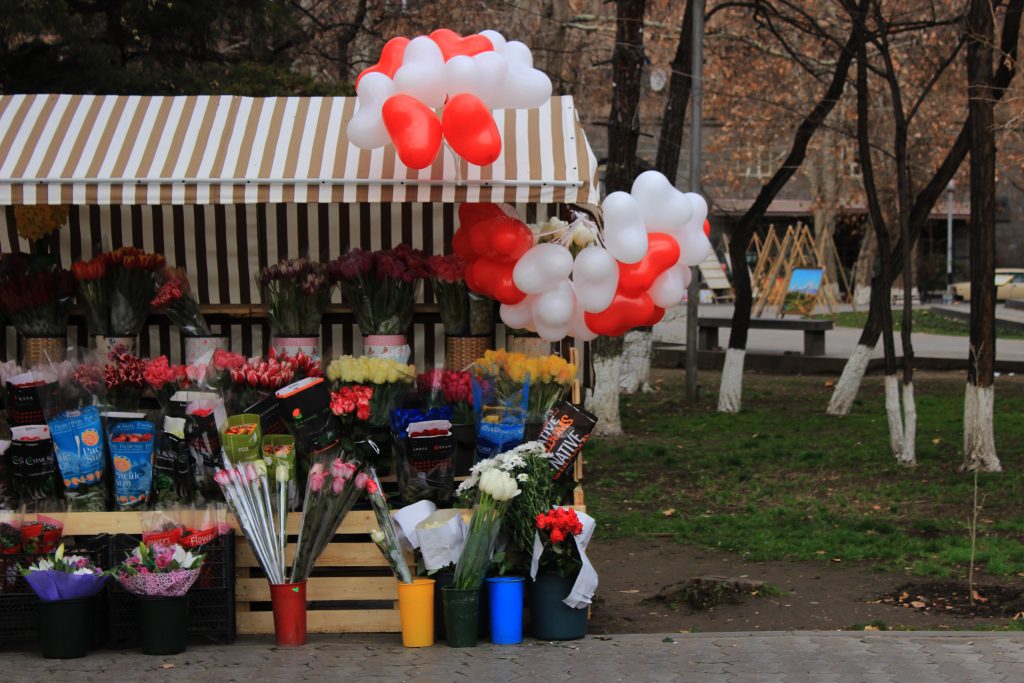This year, Armenians around the world will celebrate an important milestone in the millennia-old, storied history of their people—the establishment of the first Republic of Armenia in 1918, after nearly 550 years of statelessness.

While the willingness to commemorate of the centennial of the first republic is palpable throughout the country, Armenia’s celebratory focus is zeroed in on another important holiday today. Streets in Yerevan are adorned with colorful balloons and decorations to celebrate International Women’s Day. (Photo: Rupen Janbazian/The Armenian Weekly)
The republic had to be established from virtually nothing. Yerevan, the newly appointed capital, was a modest, mostly-rural city that boasted a population of barely 30,000 and lacked the infrastructure and organizational arrangements necessary for serving the needs of the people; Tsarist Russian autocracy had left little in place in terms of a system of government, which could be inherited and modified; and the powers to be were left to manage an influx of starving, often disease-stricken and orphaned refugees, who had just witnessed and survived the horrors of the Armenian Genocide.
The consolidation of power and establishing true statehood in the newly-proclaimed republic were, indeed, difficult tasks for a people who had remained stateless for so many centuries.
Nonetheless, despite the several external and often-ignored internal difficulties and troubles that the new republic faced, the two-and-a-half years of Armenian independence proved to be truly revolutionary: Armenia and its people were able to form government; establish its first-ever parliament; develop a judicial system and a military; and create and sustain several institutions, which continue to serve nation today, including a state university, a national police department, and a country-side press service.
One aspect of the first Republic of Armenia that is often ignored, however, is how feminist ideals—principles such as gender equality and women’s rights to take part in social affairs—were embraced by the authorities at the time.
The fact remains that nearly a century ago, Armenia became one of the first states in the world to give women the right to vote and the right to be elected—before several countries, such as the United States and many European nations. Three of the 80 elected parliamentarians in Armenia in 1919 were women and the republic even holds claim to the first female diplomat in the modern world—Dr. Diana Apcar (Anahit Agabegian), who helped Japan recognize Armenia’s independence and served as Armenia’s ambassador and consul general in the far east empire.
While the willingness to commemorate the centennial of the first republic is palpable throughout the country, Armenia’s celebratory focus is zeroed in on another important holiday today. March 8 marks International Women’s Day—a celebration that, on the surface, is taken quite seriously in Armenia (it’s even a national holiday). Streets are adorned with colorful balloons and decorations; several public events are planned in the various cities and towns across the country; the nation’s leadership, including its president and prime minister, issue grandiose statements and bestow various honors and awards to mark the holiday; and florist shops are stocked with seasonally overpriced inventory on this, perhaps the largest single sales day for flowers.
Unfortunately, the nearly month-long celebration, which begins today and extends to “Motherhood and Beauty Day” on April 7, comes at a time, when women’s rights in the country are on shaky grounds.

Florist shops throughout Yerevan are stocked with seasonally overpriced inventory on March 8—perhaps the largest single sales day for flowers in Armenia (Photo: Rupen Janbazian/The Armenian Weekly)
According to some figures, around 60 percent of women in Armenia have been subjected to some form of domestic violence; several barriers continue to stand in the way of women’s participation in Armenia’s workforce and only about 58 percent of women aged 15-64 are active participants in Armenia’s labor market; women in Armenia earn an average 35.9 percent less than men; and less than 20 percent of Armenia’s National Assembly (Parliament) are made up of women.
These figures are, of course, only some of the many problems, which exist in the country in terms of gender disparity and just the tip of the inequality iceberg in a nation that continues to prefer the birth of sons and boasts one of the world’s worst records of sex-selective abortions.
All this being said, one cannot ignore the many steps in the right directions being taken in the country in this regard. Late last year, Armenia’s National Assembly adopted legislation aimed at combating domestic violence by introducing criminal and administrative liability against those found guilty of the newly defined crime, which includes physical, sexual, psychological, and economic violence. Several organizations, such as Yerevan’s Women’s Support Center and the Women’s Resource Center of Armenia are doing crucial work by not only protecting women and their rights in the country, but by actively empowering them in the process.
Throughout the years, the Armenian Diaspora has also played a major role in ensuring that the often-ignored gender inequalities within Armenia are not only discussed, but dealt with proactively. International organizations such as the U.S.-based Armenian Relief Society (ARS)—which was established over a century ago in New York and functions though hundreds of chapters around the world—do vital, groundbreaking work in Armenia and Artsakh; the ARS’ birthing centers and incentives to increase the number of female births in Armenia and its advocacy work within the United Nations Commission on the Status of Women (CSW), for example, is truly commendable.
In the Diaspora—where even discussing issues such as domestic violence and sexual abuse were once taboo—questions are being asked and problems are being tackled head on. Less than a week from now, for example, the Boston Armenian community will gather to raise funds for one of the leading institutions working to prevent domestic violence in Armenia and to raise awareness on the status of women in Armenia.
These steps might be small and long overdue, yes, but they are necessary if Armenians around the world want to see their country free of inequity.
It is widely accepted—now more than ever—that if it were not for the establishment of the Republic of Armenia a century ago, the Armenian people would likely be unable to restore independence in 1991. So for a country, whose democratic predecessor was built on the principle of equality for all, Armenia has some ways to go.
Until then, all the colorful balloons and jubilation throughout Armenia on International Women’s Day will continue to be insincere—even superficial—displays of honor and respect in a country where women’s rights are at a deplorable—even disgraceful—state.
This March 8, it is imperative to remember that all fresh-cut flowers—however overpriced—will eventually wilt and die, and that only the establishment of true equality for all—including for Armenia’s women—can take root in this country and inspire generations to come.
The post International Women’s Day: Flowers Will Wilt and Die—the Establishment of Gender Equality Will Inspire Generations appeared first on The Armenian Weekly.
Source: Armenian Weekly
Link: International Women’s Day: Flowers Will Wilt and Die—the Establishment of Gender Equality Will Inspire Generations
